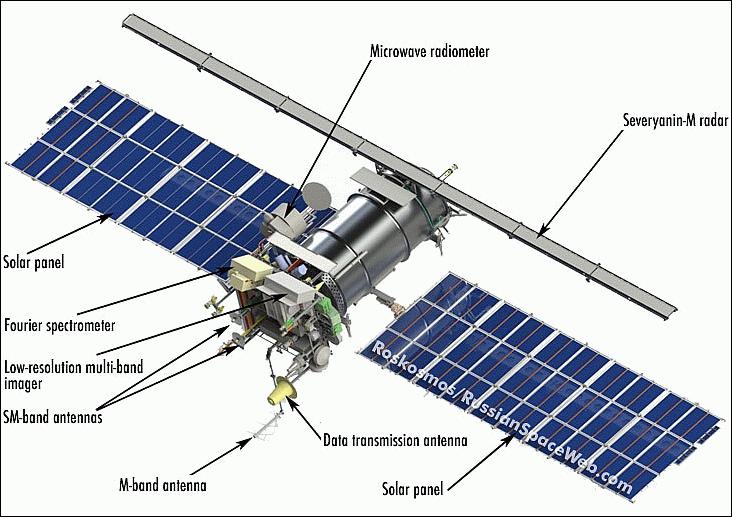Meteor M N2-2 Has Failed but Recovery May be Possible
UPDATE: It has now been confirmed by Roscosmos that the satellite was struck by what is presumed to be a micrometeorite which caused a leak of thermal transfer gas, and hence a sudden orbit change. It seems unlikely that the satellite will begin operations again as the satellite cannot operate it's camera sensors without thermal cooling. Data is being transmit currently on the X-Band, however, it appears to be a stored image only, rather than live images.
On December 18, 2019, an abnormal situation was recorded on the Meteor-M spacecraft No. 2-2 associated with an external impact (presumably a micrometeorite) on its structure. As a result, he changed the parameters of the orbit and switched to a non-oriented flight mode with high angular velocities.
In accordance with the inherent logic of operation, the device stopped fulfilling the target task and automatically switched to energy-saving mode when the on-board systems that were not involved in ensuring its functioning (including all on-board target equipment) are turned off.
After entering into the zone of Russian ground-based controls with the Meteor-M spacecraft No. 2-2, communication was established and work began to restore its operability: damping angular velocities, transferring to the standard orientation, receiving telemetric and target information.
Currently, work is underway with the satellite under the program of the chief designer. Meteor-M No. 2-2 is in an oriented flight; regular control sessions are conducted with it to receive telemetric information and information from target equipment.
Depressurization caused gas that was inside and used for heat transfer to leak out.
Resulting in some devices onboard overheating, while others did stop working.
Batteries are working under harsh thermal conditions.
Experts analyzing MSU-MR images during the incident to confirm collision.
------------------------- Original Post -------------------------
On December 18 Meteor M N2-2 suffered a failure that appears to have changed it's orbit. Roscosmos is quiet on the issue, but speculation by R4UAB is that there was a depressurization or on board explosion. However, Happysat who appears to be in contact with Roscosmos insiders has noted that on December 20 the orbit has been stabilized, and that they are working on recovering the operation of the satellite. Currently the LRPT signal and all sensors remain OFF.
Meteor M N2-2 is a Russian weather satellite that was successfully launched into orbit on July 5 2019. Like with the NOAA and Meteor M N2 satellites, it is possible to receive weather satellite images from this satellite with an RTL-SDR (when it is operational).
The older but still operational Meteor M2 satellite has failed several times in it's history too, each time with the satellite entering an unstable tumble. However, each time the satellite was recovered back into full operation after a few days.
Message from Happysat Meteor M-N 2-2.Around 17/18 Dec lost orientation. Spent two days getting him back unther control again. Succeeded today. Now analysis is stil being carrieout before it becomes operational again. Why it came is still unknown. Thanks Alex.
— Cees (@Rommelaar12) December 20, 2019

Roscosmos has made a statement.
https://bit.ly/34VMcw2